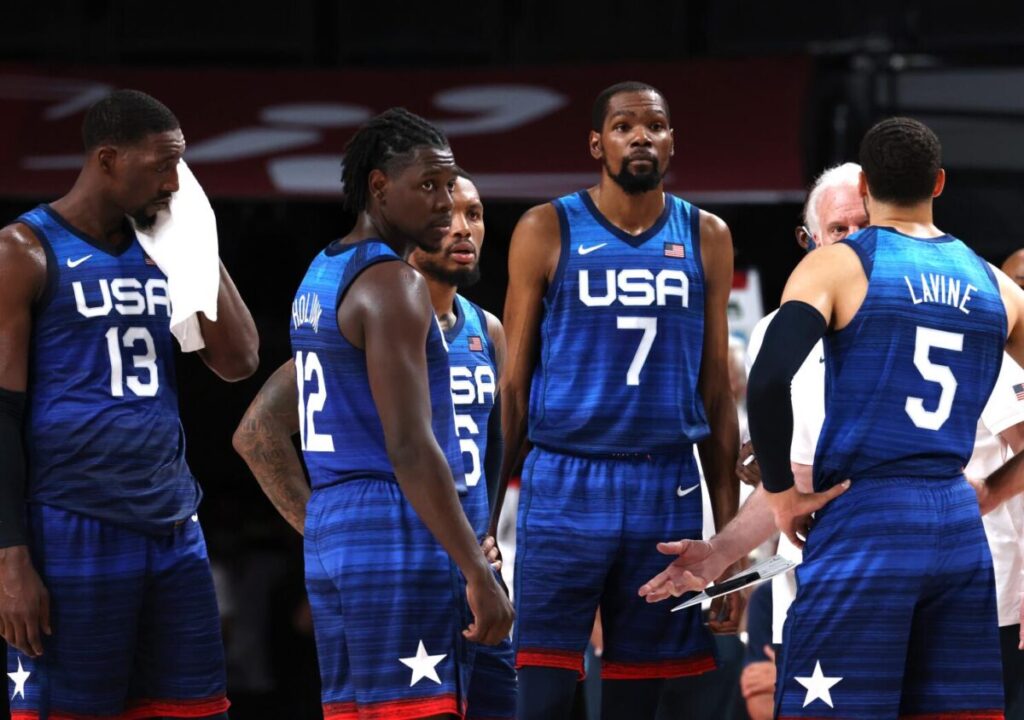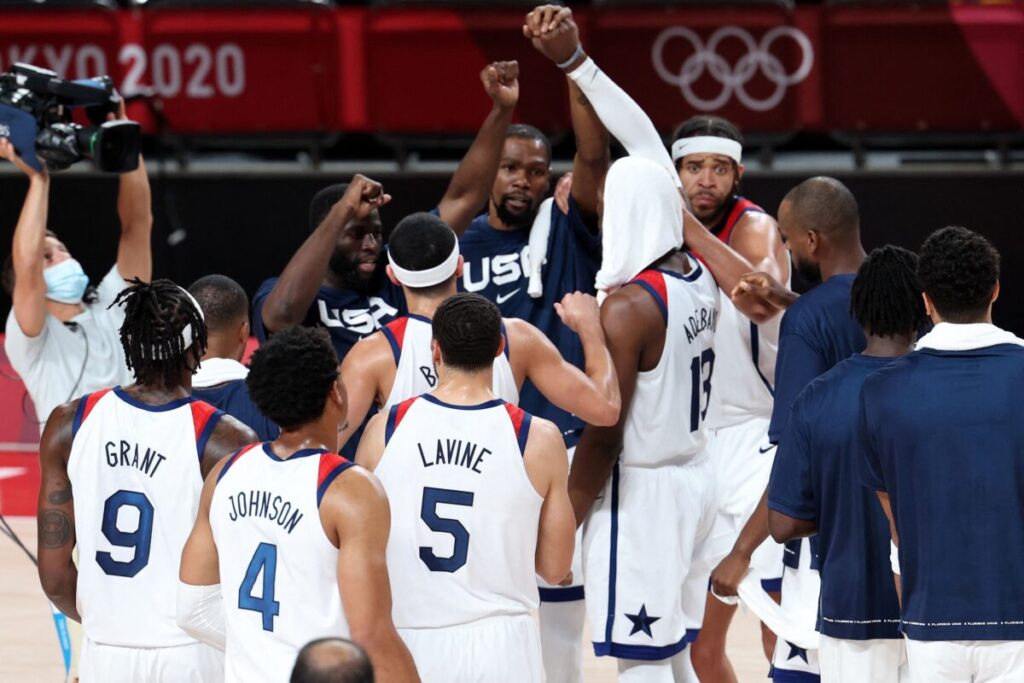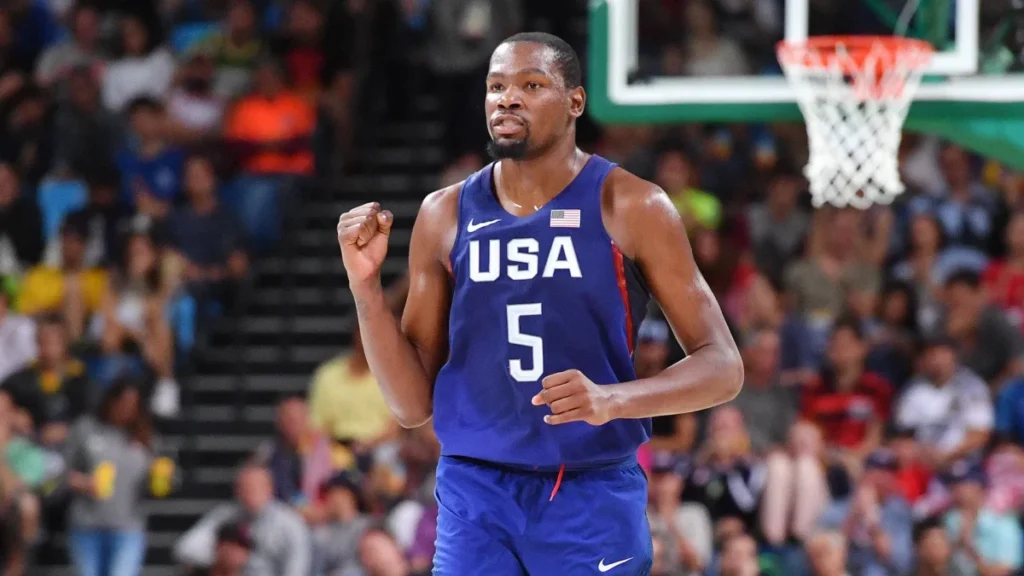
The Olympics, a quadrennial event, stands as the zenith of global sports competitions. For athletes, donning their country’s colors and competing on this grand stage is not just a matter of pride, but a dream realized.
The world watches with bated breath as the best in each sport go head-to-head, representing not just themselves but their nations. In the realm of basketball, a question often arises: Do the elite players from the NBA, the world’s premier basketball league, participate in the Olympics? The answer is layered, with a history that intertwines sports, politics, and international relations.
Historical Background
Basketball’s journey in the Olympics has seen various phases, with the participation of NBA players being a focal point of discussion for decades. Initially, the Olympics was a stage for amateur athletes, and this included basketball.
NBA players, despite being some of the best talents globally, were sidelined from representing their country in the Olympics. This restriction was not a result of their lack of skill or capability, but rather a reflection of the times and the prevailing sentiment about professional athletes’ role in what was considered an amateur competition.
The turning point came in 1988, a year that would forever change the landscape of Olympic basketball. The U.S. basketball team, composed of college players, faced a shocking defeat at the hands of the Soviet Union team in the semifinals of the 1988 Olympics. This loss, coupled with the growing realization that many countries were already fielding professional players from leagues other than the NBA, led to introspection and eventual change. The restriction on NBA players was specifically lifted, paving the way for a new era of Olympic basketball, where the best truly played against the best.
The Inception of NBA Players in the Olympics
The 1992 Olympics in Barcelona marked a revolutionary moment in the history of Olympic basketball. For the first time, NBA players were allowed to step onto the Olympic court, and the world was introduced to the “Dream Team.” This team, a blend of the most iconic names in basketball, including Michael Jordan, Magic Johnson, and Larry Bird, was not just a team; it was a phenomenon.

The decision to include professional basketball players was not solely based on the U.S.’s unexpected loss in 1988. Behind the scenes, there were broader socio-political events and discussions about leveling the playing field. Many countries had been using professional players from their local leagues for years. The distinction between amateur and professional was becoming increasingly blurred in the global context.
Interestingly, while the inclusion of NBA players was seen as a move to ensure dominance by the U.S., it was FIBA secretary general Boris Stankovic who ardently championed the cause. Stankovic’s vision was clear: for the sport to grow globally, the best needed to play against the best, irrespective of their professional status. His push, combined with the changing dynamics of international basketball, eventually led to the landmark decision.
The Evolution of Professional Players in the Olympics
With the doors open for NBA players, the face of Olympic basketball began to change. While the U.S. teams, filled with NBA stars, showcased dominance, the inclusion of these professionals had a ripple effect across the globe. Countries started to invest more in their basketball programs, and the gap between the U.S. and the rest began to narrow.
European teams, with their unique style of play and growing roster of NBA players, started to pose genuine challenges. Countries like Spain, Argentina, and France showcased their prowess, with Argentina notably winning gold in the 2004 Athens Olympics.
But it wasn’t just about the NBA. Professional players from leagues worldwide, from Spain’s Liga ACB to Australia’s NBL, began to make their mark in the Olympics. The games became more competitive, the plays more diverse, and the narratives richer. The Olympics was no longer about amateurs; it was a stage where the world’s best basketball talent converged, irrespective of where they played professionally.
This evolution was not just about competition; it was about growth. As more professional players from various leagues participated, basketball’s global appeal grew, benefiting both the sport and the Olympics. The world started to see epic matchups, legendary plays, and moments that would be etched in history forever.
The Selection Process for Olympic Basketball Teams:
The inclusion of NBA players in the Olympics naturally led to questions about the selection process. How were players chosen for the U.S. Olympic basketball team? And how did other countries navigate the blend of NBA stars, local league professionals, and amateurs?
For the U.S., the selection process is rigorous. The USA Basketball Men’s National Team Committee, a group of NBA team executives and representatives, is responsible for selecting players. While star players’ performance in the NBA season is a significant factor, the committee also considers players’ commitment to representing their country, their fit within the team’s dynamic, and their adaptability to the international style of play.

However, it’s not just about the U.S. NBA players hailing from other countries also have the opportunity to represent their native lands. Countries like Spain, France, and Argentina have their own selection criteria, often blending their NBA stars with top players from local and European leagues. This mix ensures that the national teams always have a balance of international experience and local talent, making the competition even more intriguing.
Compensation for NBA Players in the Olympics:
One of the most debated topics surrounding NBA players’ participation in the Olympics is compensation. Do these millionaire athletes get paid for representing their countries on the world’s biggest sports stage?
The general consensus is that Olympic athletes, including NBA players, do not receive salaries for their participation. However, there are nuances. For instance, NBA players representing the U.S. receive a per diem from USA Basketball (USAB). Additionally, there are monetary rewards for medal achievements, but given the substantial earnings of NBA players, these amounts are often symbolic.
A notable controversy arose around the “Dream Team” of 1992 and the subsequent 1996 Olympic basketball team. Reports suggested that these teams received a portion of the sponsorship money that USAB earned from these events. This became a contentious issue in 2000 when players discovered they wouldn’t receive similar compensation as the previous teams. Players like Ray Allen voiced their concerns, highlighting the disparity in treatment.
The debate around compensation is multifaceted. While the honor of representing one’s country is priceless, the physical demands and risks associated with playing in the Olympics, especially after a grueling NBA season, are real. Balancing national pride with fair compensation remains a topic of discussion, even as fans around the world enjoy the spectacle of NBA stars competing for Olympic glory.
Notable NBA Players in the Olympics:
Since the inclusion of NBA players in the Olympics, numerous stars have graced the international stage, showcasing their skills and passion for their respective countries. Here are some of the standout NBA players who have made significant impacts in the Olympics:
Kevin Durant
One of the most prolific scorers in the NBA, Kevin Durant has been a cornerstone for Team USA in multiple Olympic tournaments. His ability to score from anywhere on the court, combined with his leadership, has been instrumental in securing gold medals for the U.S. Beyond his scoring, Durant’s commitment to representing his country and his camaraderie with teammates has solidified his legacy as one of the all-time greats in Olympic basketball.

LeBron James
LeBron James, often regarded as one of the greatest basketball players in history, has donned the U.S. jersey in several Olympic events. With his unmatched basketball IQ, versatility, and ability to elevate his teammates, LeBron has been pivotal in ensuring Team USA’s dominance in the tournaments he’s participated in. His Olympic journey has not only added gold medals to his illustrious career but has also showcased his dedication to representing his country on the global stage.
Luka Dončić
Emerging as one of the brightest young talents in the NBA, Luka Dončić’s participation in the Olympics for Slovenia has been nothing short of spectacular. His performances in the Olympic games have been a testament to his talent, with game-winning plays and triple-double performances that have captivated basketball fans worldwide. Representing a smaller nation like Slovenia, Dončić’s impact has been profound, elevating his team to compete against traditional basketball powerhouses.
Luka Doncic and Slovenia have qualified to compete in the Olympics for the first time in the nation's history 👏 pic.twitter.com/5ZxJZ6xD7t
— ESPN (@espn) July 4, 2021
Carmelo Anthony
Carmelo Anthony, affectionately known as “Olympic Melo,” has a unique distinction in Olympic basketball. He is the first player to be a four-time Olympian in basketball for the U.S., amassing an impressive collection of three gold medals and one bronze. Anthony’s scoring ability, combined with his experience, has often been the difference-maker in close matches, making him one of the most decorated Olympic basketball players in history.
Kobe Bryant
The late Kobe Bryant, known for his fierce competitiveness and unparalleled work ethic, brought the same intensity to the Olympics. Representing Team USA, Bryant was the emotional leader for the 2008 “Redeem Team,” guiding them to a gold medal. His clutch performances and mentorship to younger players on the team showcased his commitment to bringing glory to his country. Bryant’s Olympic journey is a testament to his legacy as a player who always rose to the occasion, no matter the stage.
15 years ago today, Kobe Bryant silenced the crowd in Beijing after a huge 4-point play to secure the Gold Medal at the 2008 Olympics for Team USA aka "The Redeem Team" 🤫🥇#MambaDaypic.twitter.com/7YXdfPmYsb
— ClutchPoints (@ClutchPoints) August 24, 2023
Final Words
The participation of NBA players in the Olympics has undeniably transformed the landscape of Olympic basketball. Their inclusion has not only elevated the level of competition but has also bridged the gap between professional leagues and international tournaments. Fans across the globe now eagerly anticipate the Olympics, not just as a showcase of national pride but as a stage where the best in basketball compete for the ultimate glory.
While debates around the league’s players’ compensation and selection processes persist, the sheer talent and passion displayed by these NBA stars in the Olympics underscore the event’s significance. As we look forward to future tournaments, the legacy of NBA players in the Olympics serves as a testament to the ever-evolving and global nature of basketball.
Frequently Asked Questions
What NBA player has the most Olympic medals?
Carmelo Anthony holds the distinction of being the NBA player with the most Olympic medals. He has represented the U.S. in four Olympic tournaments and has won three gold medals (2008, 2012, 2016) and one bronze medal (2004).
Has LeBron played in the Olympics?
Yes, LeBron James has played in the Olympics. He has represented Team USA in three Olympic tournaments, winning two gold medals (2008, 2012) and one bronze medal (2004).
Sources
1. sportskeeda.com – When did NBA players start playing in the Olympics?
2. rookieroad.com – Do NBA Players Play In The Olympics?
3. americansportsplanet.com – Do NBA Players Play In The Olympics?
4. hoopsaddict.com – Do NBA Players Play in the Olympics?





